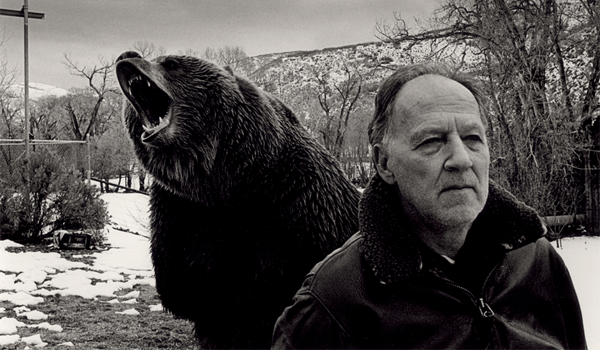With a career spanning nearly 50 years, Werner Herzog has earned a reputation for his portrayals of the outermost limits of human experience. With roots in the New German Cinema of the 60s’ and 70s’, he has, in recent times, become something of a pop culture icon, focusing heavily these days on documentaries. Now 70, some would claim that Herzog has somewhat mellowed with age, but to believe this would be folly, as anyone who has seen his recent documentaries The Cave of Forgotten Dreams, or the hard hitting Death Row meditation Into the Abyss, will testify. Herzog is a director who is never afraid of breaking new ground. This is, after all, the man who once ate his shoe on camera having lost a bet with a fellow director.
What makes Herzog’s work so watchable is his ability to pin point and examine behaviour within civilization which can be deemed at once both extreme yet justified. Running through both his fiction and documentary work this theme can be seen in efforts like 1978’s Heart of Glass, during the production of which he hypnotized the film’s cast in order to attain a realistic sense of hysteria amongst a small community. In Grizzly Man (2004), a film which initiated him to a new audience, we see the portrait of man who willingly spurned society in order to live in the wild with his obsessions, grizzly bears, with a complete disregard to the danger to his mortality.
If this all sounds slightly deep, you’ll be glad to know that there is also a playful side to Herzog, a part of him that seems to say that art and introspection is all good, but sometimes you need a taste of the other side. For proof of this you’d only need to look to his remakes of Nosferatu with Klaus Kinski and more recently Bad Lieutenant with Nicolas Cage. The latter being his first real dalliance with mainstream Hollywood.
The current BFI retrospective of his work embodies everything from his 1967 debut Signs of Life to his recent work. The programme also features a rare opportunity to see some of Herzog’s lesser known short films. Most notable of these is the 1977 documentary La Soufriere.
In 1976 La Grande Soufriere, a volcano on the Caribbean island of Guadaloupe began showing signs of activity. With fear rising that it may erupt at any moment the island was evacuated, as a pre- emptive measure, all save for one peasant living on the slopes of the volcano who refused to leave. Intrigued by this story, Herzog made his way to the island to document this man and the impending catastrophe.
All of Herzog’s documentaries retain an almost poetic quality often heightened by Herzog’s own overdubbed voice, and La Soufrierre is particularly interesting because we are shown an almost apocalyptic vision of civilization stripped down so that there is no one but animals left to occupy the streets where the traffic lights are still working. Herzog revels in this hopeless, dream-world before he reveals his trump card. There is also slight humour in the irony of the situation (eventually the volcano did not erupt) giving the film a touch of wit that compliments its poignancy, making it an appealing introduction to Herzog’s body of work.
Running until 1 August at BFI Southbank
For more information about the BFI Werner Herzog season: bfi.org.uk/werner-herzog
